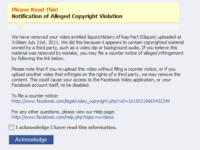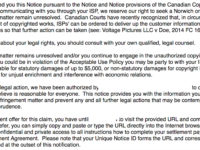The Canadian government has unveiled its long-awaited plan to fix abuses with copyright’s notice-and-notice system as part of Bill C-86, its Budget Implementation Act. Last spring, Innovation, Science and Economic Development Minister Navdeep Bains released an IP strategy that promised safeguards against intellectual property abuse, particularly use of copyright notices to send settlement demands to Internet users. The Canadian notice-and-notice system was formalized in 2012 to allow rights holders to forward allegations of online copyright infringement to internet users through their internet service provider. The system was viewed as a win-win approach since it promised to deter infringement through education rather than legal threats. Yet within hours of taking effect, anti-piracy companies began sending notices that included settlement demands backed by threats of litigation.
Post Tagged with: "notice and notice"
Supreme Court of Canada on Copyright Notices: Identification of IP Address “Not Conclusive of Guilt”
The initial emphasis on last week’s Supreme Court of Canada’s copyright notice decision has focused on how Internet providers can pass along the specific costs associated with subscriber disclosures beyond those required for the notice-and-notice system to rights holders. The ruling rightly restores the notice system back to its intended approach, but it is not the only takeaway with implications for the recent flurry of file sharing lawsuits. While there has been a huge number of claims filed in Canada (with some surprisingly large settlements), the Supreme Court acknowledged important limitations in notice claims, noting that merely being associated with an IP address is not conclusive of guilt.
Notice the Difference?: Supreme Court Rules ISPs Can Be Compensated for Copyright Costs
Policy makers have long struggled to strike a fair balance in crafting rules to address allegations of copyright infringement on the Internet. Copyright owners want to stop infringement and the right to pursue damages, Internet subscribers want their privacy and freedom of expression rights preserved in the face of unproven allegations, and Internet providers want to maintain their neutrality by resolving the disputes expeditiously and inexpensively.
My Globe and Mail op-ed notes that the Canadian system for online infringement was formally established in 2012 and came into effect in 2015. The so-called “notice-and-notice” approach grants rights holders the ability to send notifications of alleged infringement to Internet providers, who are required by law to forward the notices to the relevant subscriber and to preserve the data in the event of future legal action. The system does not prevent rights holders from pursuing additional legal remedies, but Internet providers cannot reveal the identity of their subscribers without a court order.
Tackling IP Misuse: Canada Takes the Lead in Combating the Dark Side of Intellectual Property Protection
Navdeep Bains, Canada’s Innovation, Science and Economic Development Minister, unveiled the government’s long-awaited intellectual property strategy Thursday by responding to the need to increase IP awareness, develop new IP tools for businesses, and counter IP misuse that harms both consumers and businesses. The plan to introduce new legislative rules to discourage misuse of intellectual property is particularly noteworthy since the rules should help foster a more progressive, balanced, and innovative legal framework.
My Globe and Mail op-ed notes that with proposed reforms to all of Canada’s main IP statutes, the government is taking the lead in combating the dark side of intellectual property protection. Since abuse of intellectual property rights may inhibit companies from innovating or discourage Canadians from taking advantage of the digital market, crafting rules that address misuse can be as important as providing effective protection.
Why Has the Government Failed to Act on Copyright Notice-and-Notice When Internal Docs Raise Abuse and Fraud Concerns?
Canada’s copyright notice-and-notice system has been the subject of controversy and misuse since the moment it launched in 2015. The system was intended to educate the public on copyright and reduce infringing activity through awareness (experience indicated the approach worked), but has been misused by copyright owners who have used it to send millions of settlement demands to unsuspecting Canadians. The misuse of the system was even the subject a question to Prime Minister Justin Trudeau during question period earlier this year.
While fixing the problem should be relatively easy – new regulations could prescribe precisely what may be included in the notice or there could be a prohibition on including settlement offers or demands within the notices – but the government has dragged its feet on the issue. The Conservatives knew there was a problem, but instead chose to prioritize extending the term of copyright for sound recordings after a behind-the-scenes lobbying campaign. The Liberals have similarly not acted on the issue, putting Copyright Board reform ahead in the queue.











